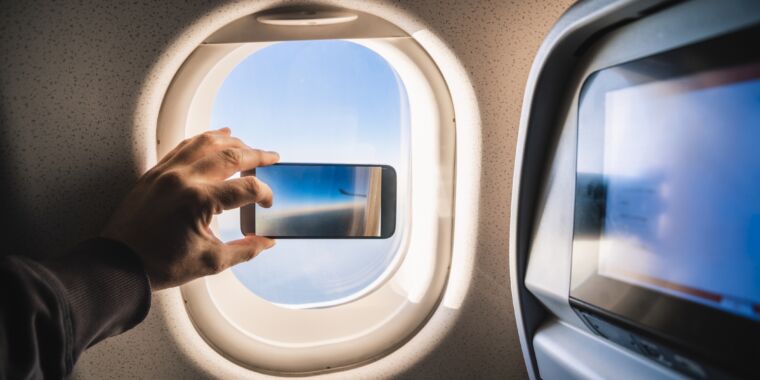
The FAA requested that AT&T and Verizon delay the deployment of 5G on C-Band frequencies, but they said they would adopt one of the world's most conservative power limits near airports for six months after the deployment. Even though the FCC determined that the use of the spectrum should not interfere with properly designed airplane altimeters, the carriers have announced other voluntary limits.
"For six months, until July 5, 2022, we will adopt the same C-Band radio exclusion zones that are already in use in France, with slight adaptation to reflect the modest technical differences in how C- Band is being deployed in the two countries," the carriers said in yesterday's "That approach would include extensive exclusion zones around the runways at certain airports." The effect would be to further reduce C-Band signal levels by at least 10 times on the runway or during the last mile of final approach and the first mile after takeoff.
The letter said that the exclusion zones in France are over 2000 meters. The larger exclusion zones will accommodate higher power levels allowed in the US.
The carriers said that US aircraft currently fly in and out of France every day with thousands of US passengers and with the full approval of the FAA. The same operating conditions should allow US airlines to operate flights in the United States if they are allowed to do so in France.
A group representing major airlines sent a letter to the FCC threatening a lawsuit and claimed that thousands of flights could be diverted or canceled every day due to interference from 5G transmissions. The spectrum is being used for 5G in nearly 40 other countries, and the FAA admitted there are no "proven reports of harmful interference" to altimeters.
Advertisement
Buttigieg on the FAA side.
The FAA Administrator and the US Secretary of Transportation wrote a letter on December 31st. The aviation industry should be given time to conduct further analysis before 5G is deployed near airports.
The deployment was supposed to be done on December 5, 2021. They objected to the new FAA/DOT request because it asked them to transfer oversight of their multi-billion dollar investment in 50 unnamed metropolitan areas to the FAA for an unknown number of months or years.
In February 2020, the FCC approved 5G transmissions in the C-Band, while requiring power limits and a 220 MHz guard band that will remain unused to protect altimeters. AT&T and Verizon spent a combined $69 billion to purchase C-Band spectrum licenses. The radio altimeters use the spectrum from 4.2 GHz to 4.4 GHz.
The guard band is going to be even bigger in 2022, because carriers don't plan to deploy between 3.8 and 3.98 GHz until 2023.
If the FCC doesn't act, airlines will file a lawsuit.
The FCC was asked to stop C-Band deployment near airports by Airlines for America. If the FCC doesn't act by noon on January 3, the group will be forced to seek judicial or other relief to avoid the immediate and unacceptable safety risks to its members' operations.
The petition claimed that interference from the C-Band will cause irreparable harm and jeopardize the function of critical aircraft safety systems, which in turn threatens to divert or cancel thousands of flights every day, thus disrupting millions of passenger reservations, causing substantial disruptions for air crews, further disrupting the U.
A4A waited until the FCC closed to file because they were playing stupid games. The FCC has no time to review or respond to stay petitions since the FCC was closed on New Year's Eve.
The FAA's fight against C-Band deployment threatens to derail the reasoned conclusions reached by the FCC after years of technical analysis and study according to six former FCC chairs.
